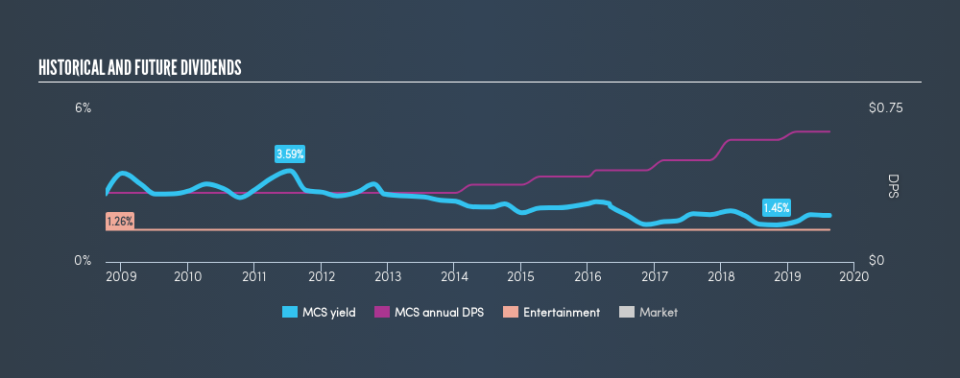Why You Might Be Interested In The Marcus Corporation (NYSE:MCS) For Its Upcoming Dividend

Some investors rely on dividends for growing their wealth, and if you're one of those dividend sleuths, you might be intrigued to know that The Marcus Corporation (NYSE:MCS) is about to go ex-dividend in just 4 days. If you purchase the stock on or after the 23rd of August, you won't be eligible to receive this dividend, when it is paid on the 16th of September.
Marcus's upcoming dividend is US$0.16 a share, following on from the last 12 months, when the company distributed a total of US$0.64 per share to shareholders. Looking at the last 12 months of distributions, Marcus has a trailing yield of approximately 1.8% on its current stock price of $35.01. If you buy this business for its dividend, you should have an idea of whether Marcus's dividend is reliable and sustainable. So we need to check whether the dividend payments are covered, and if earnings are growing.
See our latest analysis for Marcus
If a company pays out more in dividends than it earned, then the dividend might become unsustainable - hardly an ideal situation. Marcus paid out a comfortable 41% of its profit last year. Yet cash flow is typically more important than profit for assessing dividend sustainability, so we should always check if the company generated enough cash to afford its dividend. The good news is it paid out just 21% of its free cash flow in the last year.
It's encouraging to see that the dividend is covered by both profit and cash flow. This generally suggests the dividend is sustainable, as long as earnings don't drop precipitously.
Click here to see the company's payout ratio, plus analyst estimates of its future dividends.
Have Earnings And Dividends Been Growing?
Companies with consistently growing earnings per share generally make the best dividend stocks, as they usually find it easier to grow dividends per share. If business enters a downturn and the dividend is cut, the company could see its value fall precipitously. Fortunately for readers, Marcus's earnings per share have been growing at 17% a year for the past five years. Earnings per share are growing rapidly and the company is keeping more than half of its earnings within the business; an attractive combination which could suggest the company is focused on reinvesting to grow earnings further. This will make it easier to fund future growth efforts and we think this is an attractive combination - plus the dividend can always be increased later.
The main way most investors will assess a company's dividend prospects is by checking the historical rate of dividend growth. Marcus has delivered an average of 6.5% per year annual increase in its dividend, based on the past 10 years of dividend payments. We're glad to see dividends rising alongside earnings over a number of years, which may be a sign the company intends to share the growth with shareholders.
The Bottom Line
From a dividend perspective, should investors buy or avoid Marcus? Marcus has been growing earnings at a rapid rate, and has a conservatively low payout ratio, implying that it is reinvesting heavily in its business; a sterling combination. There's a lot to like about Marcus, and we would prioritise taking a closer look at it.
Wondering what the future holds for Marcus? See what the three analysts we track are forecasting, with this visualisation of its historical and future estimated earnings and cash flow
We wouldn't recommend just buying the first dividend stock you see, though. Here's a list of interesting dividend stocks with a greater than 2% yield and an upcoming dividend.
We aim to bring you long-term focused research analysis driven by fundamental data. Note that our analysis may not factor in the latest price-sensitive company announcements or qualitative material.
If you spot an error that warrants correction, please contact the editor at editorial-team@simplywallst.com. This article by Simply Wall St is general in nature. It does not constitute a recommendation to buy or sell any stock, and does not take account of your objectives, or your financial situation. Simply Wall St has no position in the stocks mentioned. Thank you for reading.

